#francis ponge
Text
Good omens is about how ambiguous the human concept of morality is and yeah that's hilarious
I think GO is another great exemple of how showing the absurdity of something can only be done when exposing it at its purest degree.
How to demonstrate morality ? What embodies this concept ? How to make it speak ? Who's the bad guy, because stories need a bad guy, thet always needed a bad guy. Oh, right, we humans made a book special because I guess its storytelling was kinda fire like WOW the guy who wrote this def knew what he was doing with large casts and complex plots... But anyway it told things like do good things and don't do bad ones. Yeah right. And it has these creatures that are good and those who are bad .
And if you want to question this "morality" concept, and how impossible it is to apply to us, let's use these little weird angels and demons creatures, because look how not even them can embody the concept properly. They'll have feelings because things that exist either have feelings or can be given feelings because we humans have words and we can only describe things with words. Words are feelings (read some Francis Ponge).
How ironic that is that, in Good Omens, it start as a joke, that morality is literally impossible to define, and it ends as a fucking devasting and harder to read contemplation on how good and bad makes so much nonsense. S2's end is devastating because everything about it is ambiguous, and no character is right. The music that plays during the kiss is harmonically weird. There's sparks and sadness at the same time. Both character's reaction are conflicted : Crowley leaves in desperation, but waits a little, in hope. Aziraphale hesitates, hides how confused he is, sticks to the morality he was taught. No one is still sure on the meaning for "I forgive you/don't bother" + Aziraphale's smile in the credits. the last scene, when they catch eachother's sight in the moving crowd, makes me think of that evangelion shot where it's footage of a crowded street with only the protagonists standing, unmoving and staring at the camera. Loneliness. And Love. And Morality.
What's to be learned : to express something complex, use the simplest way to picture it.
#good omens#good omens theories#go2#morality#francis ponge#nge somehow#yeah it's my first tumblr post who can stop me#writing#art#david arnold#good omens soundtrack#aziraphale#crowley#neil gaiman#I have no idea how this thing work someone help me
34 notes
·
View notes
Photo

Francis Ponge, Le parti pris des choses, [1942, 1945]
535 notes
·
View notes
Text
Alone, obviously the snail […] is the friend of the earth it kisses with its entire body, and of leaves, and of the sky towards which it proudly lifts its head, with those so sensitive eyestalks; nobility, deliberation, wisdom, arrogance, vanity, pride.
— Francis Ponge, Selected Poems, transl by Margaret Guiton, John Montague and C.K. Williams, (1994)
22 notes
·
View notes
Text
Chaque mot, chaque idée, chaque chose est une sorte de nœud mouvant, de remous insondable : cela une fois compris, il faut retomber sur ses pieds et faire en souriant ce que l’on a à faire sur son barreau d’échelle.
Francis Ponge, Nouveau nouveau recueil II, Gallimard, 1992
10 notes
·
View notes
Text
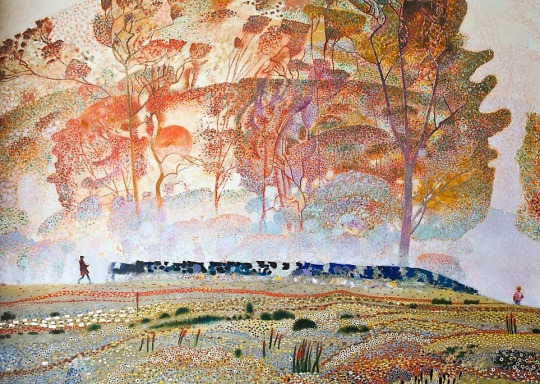
Viktor Zaretsky. Glowing Sky. 1988
* * * *
The Trees Delete Themselves Inside a Fog-Sphere
BY FRANCIS PONGE
TRANSLATED BY KAREN VOLKMAN
In the fog which surrounds the trees, the leaves are stripped—leaves defaced already by slow oxidation, deadened by the sap's out-seeping for flowers' and fruits' gain, since the harsh heats of August made of them a less.
In the bark, vertical furrows crease and slit where dampness drains to the earth's base, indifferent to the living citizens of the trunk.
Flowers scattered, fruit conferred. Since youth, this relinquishing of breathing attributes and body parts has become for the trees a standard practice.
9 notes
·
View notes
Text
La fonction de l'artiste est ainsi fort claire, il doit ouvrir un atelier et y prendre en réparation le monde, par fragments, comme il lui vient. Non pour autant qu'il se tienne pour un mage. Seulement un horloger
Francis Ponge (Méthodes)
8 notes
·
View notes
Text

« La bouche en son palais – c’est le temple du goût – procède à ses appréciations particulières. Elle s’y fait son opinion elle-même, puis la communique au cerveau, siégeant en chambre du conseil, par l’intermédiaire de l’arrière-nez, chargé de l’odorat, avec lequel tout au long de vestibules et d’escaliers intérieurs elle se concerte. »
Francis Ponge
25 notes
·
View notes
Text
...Ponge realized that one couldn't go on for long burrowing into words without any purchase on things; he turned away from the great Surrealist prattling which, in many cases, consisted merely in banging objectless words against one another. He could renew the meaning of words and fully appropriate their deep resources only by employing them to name other things.
So, if it is to be complete, the revolution of language has to be accompanied by a re-routing of attention: discourse has to be wrested from its commonplace usage, our gazes turned towards new objects, and we have to render the "infinite resources of the density of things . .. with the infinite resources of the semantic density of words."
Jean-Paul Sartre, "Man and Things" (Chris Turner's translation of "L'homme et les choses")
4 notes
·
View notes
Text
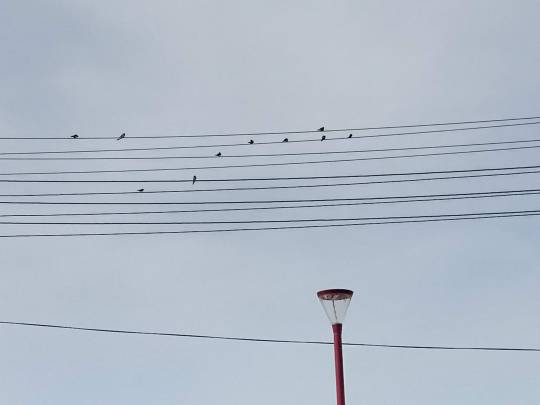
Ph. La bouquiniste
(...)
Flèche timide (flèche sans tige) ― mais d'autant véloce et vorace ― tu vibres en te posant ; tu clignotes de l'aile.
Maladroite, au bord du toit, du fil, lorsque tu vas tomber tu te renvoles, vite !
Tu décris un ambage aux lieux que de tomber
(comme cette phrase).
Puis, ― sans négliger le nid, sous la poutre du toit, où mes mots piaillent : la famille famélique des petits mots à grosse tête et bec ouvert, doués d'une passion, d'une exigence exorbitantes ―
Tu t'en reviens au fil, où tu dois faire nombre.
(Posément, à la ligne.)
Francis Ponge "Les hirondelles"
*Et en avant la musique car elles sont là!*
4 notes
·
View notes
Photo
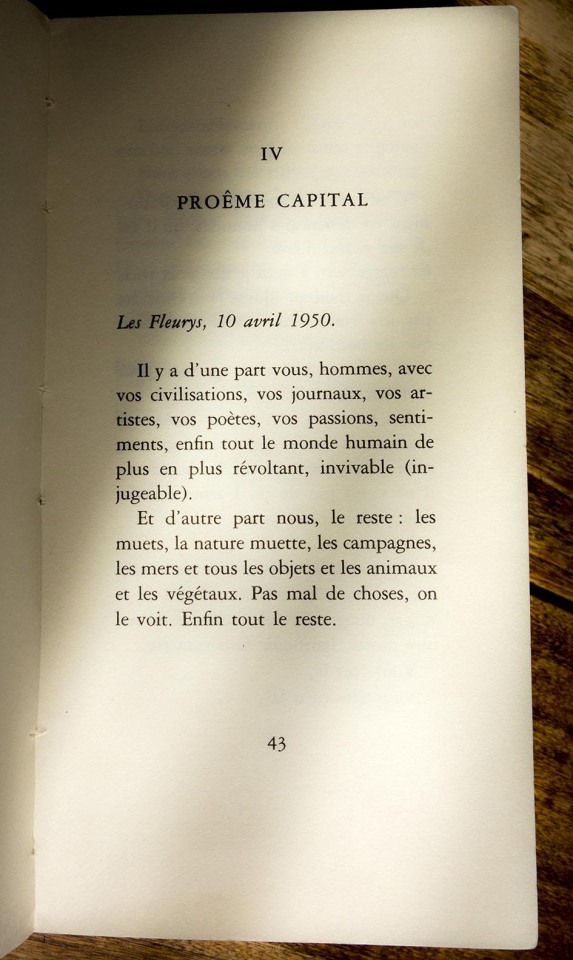
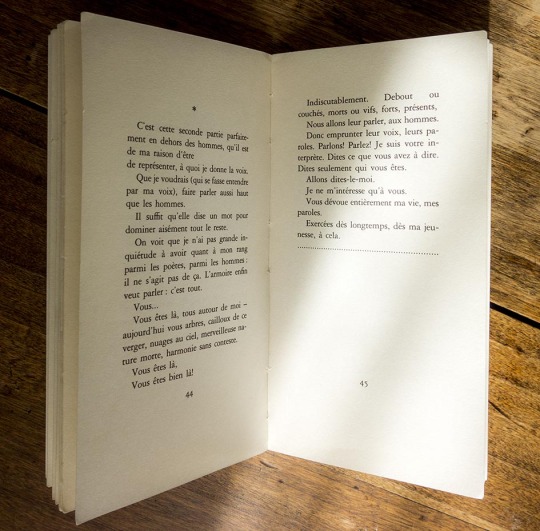
Nioque de l'avant-printemps, Francis Ponge
37 notes
·
View notes
Text
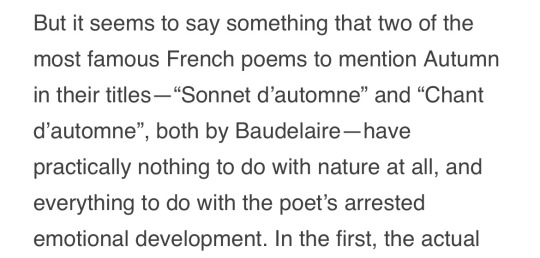
I've definitely lost interest in 'traditional' lyric poetry like that. But that's not to discount the emotional or expressive completely!
“I am not a poet,” [Ponge] declares, “I try to start from the object and be as objective as possible. My feelings undoubtedly intervene afterwards, but the “Revolution” is, instead of using the rain to express my feelings, to describe the rain, and because I am a man the same words which are used to describe the rain, also serve to express emotions.
#as inconsistent as ponge could be i think that's a good statement#when he's at his best#francis ponge#my aesthetic
3 notes
·
View notes
Photo
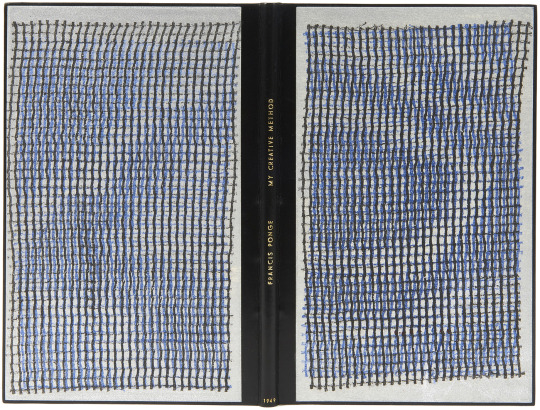
Francis Ponge, My creative method, Atlantis Verlag, Zürich, 1949, Edition of 50 numbered copies not for sale
#graphic design#geometry#pattern#binding#book#cover#book cover#back cover#francis ponge#atlantis verlag#1940s
280 notes
·
View notes
Text
In sentient memory all gets confused.
— Francis Ponge, Selected Poems, transl by Margaret Guiton, John Montague and C.K. Williams, (1994)
4 notes
·
View notes
Text
Francis Ponge
"The Oyster"
The oyster, the size of an average pebble, looks tougher, its colour is less uniform, brilliantly whitish. It is a stubbornly closed world. And yet, it can be opened: one must then hold it in the hollow of a dish towel, use a jagged and rather tricky knife, repeat this many times. Curious fingers cut themselves on it, nails break on it: it’s tough going. Hitting it that way leaves white circles, like halos, on its envelope.
Inside, one finds a whole world to drink and eat: under a nacreous firmament (strictly speaking), the heavens above recline on the heavens below and form a single pool, a viscous and greenish bag, that flows in and out when you smell it or look at it, fringed with blackish lace along the edges.
Sometimes, a very rare formula pearls in their nacreous throat, and right away you have an ornament.
3 notes
·
View notes
Quote
En la niebla que rodea los árboles, les son sustraídas las hojas; que después de los grandes calores de agosto, desconcertadas por una lenta oxidación y mortificadas por el retiro de la savia en provecho de flores y frutos, se aferraban menos a ellos.
En la corteza se ahuecan surcos verticales por donde la humedad hasta el suelo es conducida a desinteresarse de las partes vivas del tronco.
Las flores se dispersaron, los frutos cayeron. Desde la más temprana edad, la resignación de sus cualidades vivas y de partes de sus cuerpos se ha vuelto para los árboles un ejercicio familiar.
Francis Ponge, «Los árboles se deshacen dentro de una esfera de niebla» en De parte de las cosas. Traducción de Silvio Mattoni.
15 notes
·
View notes
Text
That is the example that snails offer us: saints who make masterpieces of their lives, works of art of their own perfection. They secrete form. Nothing outside themselves, their necessity, or their needs is their work. Nothing is out of proportion with their physical being. Nothing that is unnecessary or obligatory.
And so they delineate the duties of humanity: great thoughts come from the heart. Live a better life and make better verses. Morality and rhetoric combine in the ambition and desire of the wise.
How are they saints? Precisely by obedience to their nature. So: know yourself. And accept yourself for what you are. In agreement with your vices. In proportion with your measure.
What is most appropriate to the human being? Words. Decency. Our humanism.
Snails, Francis Ponge (Translated from French)
3 notes
·
View notes